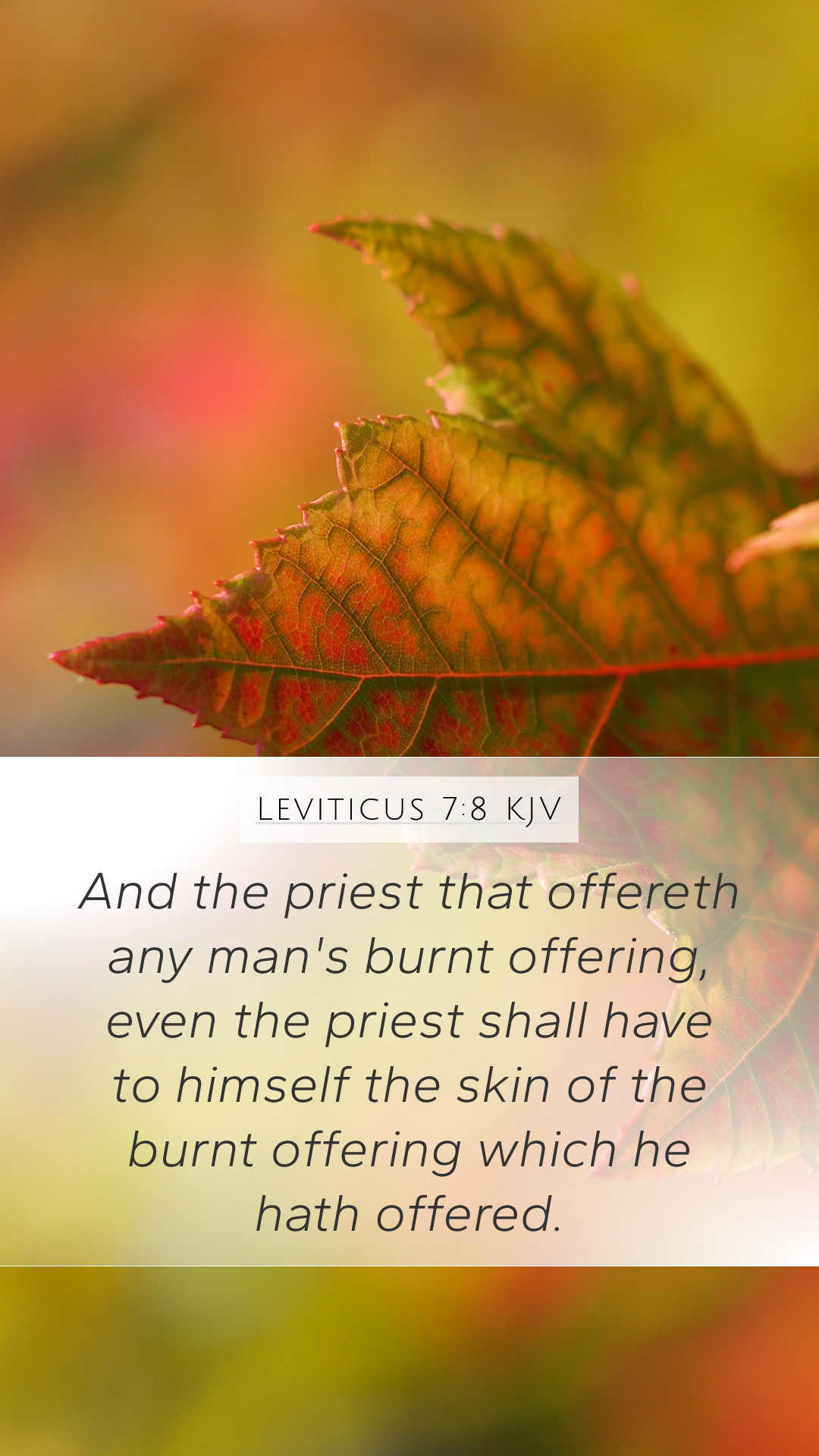Understanding Leviticus 7:8 - Biblical Exegesis and Commentary
Leviticus 7:8 states: "And the priest that offers any man’s burnt offering, even the priest shall have to himself the skin of the burnt offering which he hath offered." This verse is part of the broader sacrificial regulations outlined in Leviticus, particularly focusing on the role of the priests and the offerings brought by the people.
Meaning of Leviticus 7:8
This verse emphasizes the attribution of certain privileges to priests in the context of sacrificial worship. It reveals both a practical and symbolic significance in the sacrificial system established in ancient Israel. Below are insights derived from esteemed public domain commentaries:
-
Matthew Henry's Commentary:
Henry explicates that priests were to receive the skin of the burnt offerings which they had offered. This act signifies compensation for their service and underscores their intimate involvement in the rituals. It reflects God's provision for those who minister in His sanctuary, affirming the bond between service and sustenance in spiritual matters.
-
Albert Barnes' Notes:
Barnes notes that this verse denotes a special privilege for the priests, emphasizing that their labor in offering sacrifices was acknowledged and thereby rewarded. This serves as a reminder of the importance of the sacrificial system and how it provided for those who dedicated their lives to serving God.
-
Adam Clarke's Commentary:
Clarke provides a detailed examination of the implications of having the skin as a priestly right. He views this not only as a provision but also as a theological statement about the offerings being a source of life and sustenance for the priestly class, thus recognizing them as the mediators between God and the people.
In-Depth Bible Verse Analysis
This particular scripture can be analyzed through multiple lenses, including theological, historical, and practical applications:
-
Theological Implications:
Leviticus 7:8 illustrates the essential role of priests in the sacrificial system. As mediators, they maintain a sacred connection between God and the Israelite community. Their sustenance from the offerings serves as a symbol of God’s provision for spiritual leaders.
-
Historical Context:
Understanding the socio-religious framework of ancient Israel assists in grasping the significance of this verse. In a time when the priesthood was integral to worship, their physical needs being met through offerings was pivotal for the ongoing practice of faith.
-
Practical Application:
Modern readers can extract valuable lessons from the notion of service and provision. It challenges individuals to consider how they support their spiritual leaders and communities, fostering a culture of honor and sustenance in their respective congregations.
Significance in Bible Study
Leviticus 7:8 highlights several themes relevant to Bible verse understanding, including:
- The rewards of serving in ministry
- The importance of recognizing the contributions of spiritual leaders
- The dedication required in offering sacrifices
Related Bible Cross References
- Numbers 18:8-10 - Details the priestly rights concerning offerings.
- Deuteronomy 18:1-5 - Discusses the privileges of the Levitical priests.
- Leviticus 6:26 - Connects the priest's role to the sacrificial offerings.
Conclusion
Leviticus 7:8 serves as an essential verse depicting the relationship between God, the priests, and the offerings made by the people. Through its study, readers can gain insights not only into the priestly duties but also into broader themes of support, servitude, and divine provision. Such study encourages deeper engagement with Scripture and enhances understanding in Bible study groups and personal applications of these timeless teachings.


